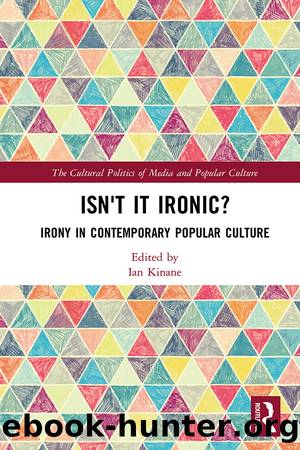Isn't it Ironic? by Ian Kinane

Author:Ian Kinane [Kinane, Ian]
Language: eng
Format: epub
ISBN: 9780367530815
Barnesnoble:
Publisher: Taylor & Francis
Published: 2021-04-26T00:00:00+00:00
This is another picture of pursuit, of the idea that the self is perhaps a web of chaotic texts, but not merely that. In Stevensâs compositions, we see that the fragmentation of the self is not because of its disappearance (or the fact that it never existed) but its inflatedness. Stevens claims here that truth is not necessarily found or constructed, but that it is an independent reality that must impose itself, even write itself, on the individual, the object of impassioned pursuit. In the live performances of the album Age of Adz, Stevens argued that the more one focuses on the self, the less human he or she becomes; the self is then flattened, commodified, and ultimately destructive. This flattening can only be remedied through an act of redemptive recreation, an apocalyptic visitation from the outside. This ghostly visitation must, in a sense, âmurderâ the consumer self in order to recreate it. This position, obviously very much in line with orthodox Christian theology, still provides the framework of Stevensâs own relationships to the texts he both reads and creates. He is author and reader, he is a fragmented self, attempting to be an agent of transformation and recreation.
The Age of Adz is a journey through what author Douglas Coupland (1994) calls âironic hellâ, a space of distrust, doubt, and cynicism in which âirony scorche[s] everything that it touchedâ (286, 273). Yet Stevens forges his way through the flames, arriving on the other side with an authentic faith. The word âauthenticâ is one of the most frequent descriptors used by Stevensâs fans â many of whom are not Christians â in the Facebook fan group named âSufjan Stevens Feelspostingâ (2020). One member writes: â[h]is storytelling on every song is just so magical and immersive it really didnât matter to me that he was religious and I wasnât. He sung of the beauty of his faith but also his doubts and strained relationship at timesâ (âSufjan Stevens Feelspostingâ 2020, n.p.). Interestingly, the word âmagicalâ has connotations of enchantment, and it is often used to describe postsecular art. Other frequent terms used to describe Stevensâs music in the fan group are âgenuineâ, âpersonalâ, and âmysteriousâ. Much attention is given to the fact that the artist is not âpreachingâ to his listeners but sharing his own faith journey in an authentic manner. In a Reddit thread discussing the religious nature of much of Stevens music, one writer notes that: â[m]ost âChristianâ music makes me glad to be atheist; Sufjanâs stuff (particularly Seven Swans) made me wish I was Christianâ (augustfirst 2011, n.p.).
While Sufjan Stevensâs writing is famously cryptic â and while it takes a great deal of effort to âdecodeâ the symbols of his frequently ambiguous lyrical narratives â Craig Finnâs writing is the polar opposite; it is clear and buoyant, inviting listeners and concert-goers to join him in embracing the joy that can only be found when their ironic skin is shed. As Andy Walton (2015) explains in The Christian Post: â[a]t the end of most gigs [Finn] tells the crowd that there is âSo.
Download
This site does not store any files on its server. We only index and link to content provided by other sites. Please contact the content providers to delete copyright contents if any and email us, we'll remove relevant links or contents immediately.
Nudge - Improving Decisions about Health, Wealth, and Happiness by Thaler Sunstein(7707)
The Fire Next Time by James Baldwin(5446)
iGen by Jean M. Twenge(5416)
Adulting by Kelly Williams Brown(4574)
The Sports Rules Book by Human Kinetics(4387)
The Hacking of the American Mind by Robert H. Lustig(4383)
The Ethical Slut by Janet W. Hardy(4253)
Captivate by Vanessa Van Edwards(3839)
Mummy Knew by Lisa James(3693)
In a Sunburned Country by Bill Bryson(3542)
The Worm at the Core by Sheldon Solomon(3487)
Ants Among Elephants by Sujatha Gidla(3467)
The 48 laws of power by Robert Greene & Joost Elffers(3291)
Suicide: A Study in Sociology by Emile Durkheim(3022)
The Slow Fix: Solve Problems, Work Smarter, and Live Better In a World Addicted to Speed by Carl Honore(3009)
The Tipping Point by Malcolm Gladwell(2922)
Humans of New York by Brandon Stanton(2873)
Get What's Yours for Medicare: Maximize Your Coverage, Minimize Your Costs by Philip Moeller(2732)
Handbook of Forensic Sociology and Psychology by Stephen J. Morewitz & Mark L. Goldstein(2705)
